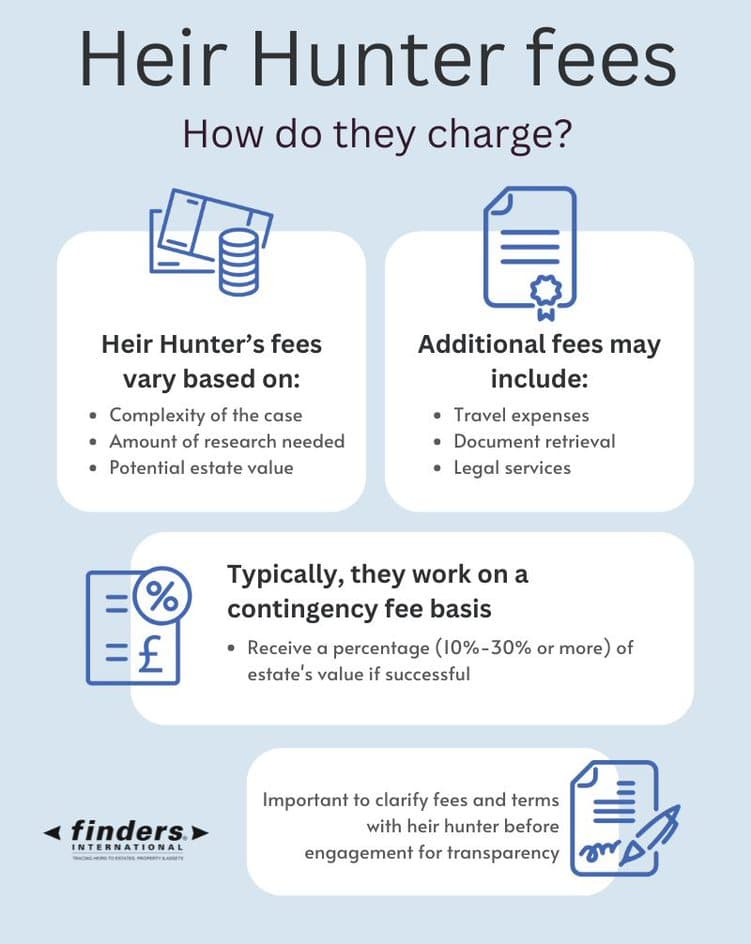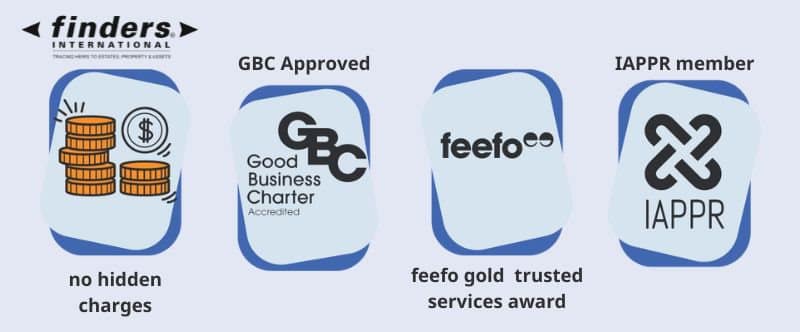
Written by Kirsty O'brien
Tags: Estates, Heir Hunters, unclaimed estates
Are you an avid fan of BBC One daytime TV Show, Heir Hunters? If so, you’ll understand the nature of the role of a probate researcher and may have seen Finders International in action 👉🏽 BBC One – Heir Hunters.
What is an Heir Hunter?
An heir hunter, also known as a probate researcher or probate genealogist, is someone who specialises in locating potential heirs to an estate when someone dies intestate (without a will) or when there are missing or unknown heirs named in a will. They typically conduct extensive genealogical research to trace family trees and identify individuals who may be entitled to inherit assets from the deceased person’s estate. Heir hunters play a vital role in the intricate process of estate distribution, ensuring that rightful inheritors receive what is rightfully theirs.
Heir hunters often work on a contingency fee basis, meaning they receive a percentage of the estate’s value if they successfully locate and prove the entitlement of heirs
Do Heir Hunters Deal with small estates?
At Finders International, we often take on small estates, even though it might not seem beneficial at first glance. A small estate generally consists of assets worth less than £10,000. Heir hunters still pursue small estates because hidden assets may exist. For instance, a seemingly insignificant estate might hide a large bank account, a valuable life insurance policy, or a collection of rare items.
How much do Heir Hunters Charge?
The fees charged by heir hunters can vary depending on several factors, including the complexity of the case, the amount of research required, and the potential value of the estate. Typically, heir hunters work on a contingency fee basis, meaning they receive a percentage of the estate’s value if they successfully locate and prove the entitlement of heirs. This percentage can range from around 10% to 30% or more of the estate’s value.
Some heir hunters may also charge additional fees for expenses such as travel, document retrieval, and legal services. It’s essential to discuss fees and terms with an heir hunter before engaging their services to ensure clarity and transparency.

Heir Hunters: The TV Series
BBC One daytime TV show Heir Hunters follows the work of probate researchers looking for distant relatives of people who have died without making a will.
At the heart of heir hunting lies the human element – the stories, the connections, and the reunions. Heir hunters act as catalysts for family reunions, bridging gaps between long-lost relatives and bringing closure to unresolved family mysteries. Their work goes beyond mere transactions; it’s about restoring family ties and preserving legacies for generations to come.
Finders International became a main firm on BBC Heir Hunters from series 8, all the way through to series 12.
“There are currently over 5000 unclaimed estates in the UK. In most cases, the rightful heirs are out there and can find themselves the recipients of an unexpected windfall.”
Remember the story of the O’Donnell brothers?
Jimmy and Fred O’Donnell spent nearly their whole lives believing they were an only child. It was only when Fred’s daughter, Theresa Wardley, researched into their family tree did they realise that Fred had an older brother, Jimmy.
To track Jimmy down, Theresa put out an appeal in a local newspaper and Finders International responded. After our team of heir hunters located Jimmy, the brothers were able to meet for the very first time. Jimmy at the age of 80 and Fred at 78.
Heir Hunters in the press / media
ITV This Morning: Reuniting Long Lost Sisters
Five sisters were all separated as children and grew up not knowing that each other existed. Three of the sisters managed to find each other in their twenties but spent the next 50 years trying to find the other two.
The sisters were reconnected with the fourth sister – 70 years after they were separated. An amazing story of determination and learning all about their emotional reunion.
Finders International founder Daniel Curran who helped them reconnect joins Holly, Phil and 4 of the 5 sisters on the ITV This Morning sofa.
BBC London: Story Of A Forgotten Treasure Chest
A treasure chest owned by a Royal Air Force pilot, British diplomat and OBE recipient was discovered during a house clearance – sparking a nationwide search for the family.
Nicola Turner, 52, of Radlett, Hertfordshire, unearthed the 23ft by 3ft metal and wooden chest when clearing out an annex of her late mother-in-law’s house – and found it belonged to a Flight Lieutenant Rex Goring-Morris.
Finders International took on the hunt and tracked down the family – presenting David (Rex’s Son) with the chest one week before what would have been Fl Lt Goring-Morris’s 95th birthday and 33 years after his death.
BBC News: A Forgotten WWII Veteran
The case of James Knowles, as featured on BBC One Heir Hunters.
James Knowles died aged 91 at Eastbourne District General Hospital in 2016. After his passing, the hospital’s chaplain, Reverend Nolan could not find James’s next of kin, and was tasked with organising his funeral.
He appealed to local residents on Facebook to attend the ceremony, and 120 people turned out to pay their respects, including many fellow veterans from the Royal Marines, Royal British Legion, 3rd Battalion Queen’s Regiment and coastguards.
The Government’s legal department advertised James’s case as unclaimed the day after the funeral and it was picked up by professional probate genealogists Finders International. The heir hunters discovered Pauline from Herne Bay in Kent – who is a first cousin once removed.
Pauline comments, “It was totally unexpected. We had no idea that James existed. It’s very sad to think that none of the family went to his funeral, but what is fantastic is that through Finders International we’ve been put in touch with a lot of our cousins.”
Daily Mirror: Woman inherits thousands from a relative I didn’t know existed
Mr Anderson passed away in a care facility and left no will. He appeared to have no known next of kin to receive his estate.
When Dr Anna Phillips was told that she’d inherited a share of an £180,000 inheritance from a man she had never met, she assumed it was a scam.
Dr Phillips, an art teacher at an international school in Kyrgyzstan, was one of the beneficiaries of Mr Anderson’s estate. He was born in 1938 in Everton, was an only child who never married or had children but further investigation into George’s family led researchers to Australia, Malta, Canada, and Kyrgyzstan, eventually connecting all 26 beneficiaries back to the estate.
Dr Phillips described the “surreal” experience of discovering her family connection to George Anderson, who died in Kirby, Merseyside in 2019.
The Scottish Sun: Finders International unearth long-lost son of Scottish adventurer
Finders International were asked to locate the next-of-kin of William Page Mitchell who sadly passed away aged 89 in his flat in Glasgow city centre in 2010.
William was a former RAF pilot, had not made a will, and there were no known next-of-kin for the authorities to contact.
After some extensive research, our team managed to locate and make contact with William’s 74-year-old son Andrew. The last time Andrew had seen his father was at his grandmother’s funeral – more than 40 years ago.
Even though William didn’t leave behind much in the way of value to his estate, it did provide closure for his son.
On contacting Andrew, he said; “While my father went his own way over 40 years ago, I’m grateful to the Scottish team at Finders International for helping me to finally close this chapter of my life.”
How do I become an Heir Hunter?
To become an heir hunter in the UK, you typically need a combination of education, skills, and experience in genealogy, research, and probate law. Here's a general guide:
- Education
While there’s no specific educational requirement to become an heir hunter, having a background in genealogy, history, law, or a related field can be beneficial. You might consider pursuing a degree in one of these areas to gain relevant knowledge and skills.
- Gain Genealogical Skills
Develop strong research and genealogical skills. This involves learning how to trace family histories, understand legal documents such as birth, marriage, and death records, and navigate archives and online databases effectively.
- Understand Probate Law
Familiarise yourself with probate law and the legal processes involved in estate administration in the UK. This includes understanding intestacy laws, wills, inheritance tax, and other relevant legal concepts.
- Gain Experience
Gain practical experience by working with established heir hunting firms or genealogical research companies. This can provide you with valuable hands-on experience in conducting research, tracing family trees, and handling probate cases.
- Networking
Build a network within the genealogy and probate law communities. Attend industry events, join professional associations, and connect with other professionals in the field to expand your contacts and opportunities.
- Obtain Certifications
Consider obtaining professional certifications in genealogy or related fields to enhance your credibility and expertise.
- Continuing Education
Stay updated on developments in genealogy, probate law, and relevant technologies by participating in continuing education programmes, attending workshops, and engaging in self-study.
Finders International Vacancies
We are always interested in hearing from anyone with relevant experience or transferable skills. Check out our current vacancies, here.
Heir Hunters - Bona Vacantia List
Ever watched an episode of Heir Hunters and wondered if a long-lost relative might have passed away and left an unclaimed estate you may be entitled to? You’re not alone!
There are currently over 5000 unclaimed estates in the UK. In most cases, the rightful heirs are out there. They might not be closely related – or even know of the deceased – but there are almost always family members who can be traced and can find themselves the recipients of an unexpected windfall.
This money can be life-changing, but more often than not, it’s a nice windfall that can be used for a holiday, new car or anything else that might not have been possible without it.
The current full list of unclaimed estates in England & Wales can be seen on our ‘Bona Vacantia List’ website: www.bonavacantialist.co.uk
Are Heir Hunters Regulated?
Although the industry as a whole is not regulated, as the largest firm of Heir Hunters in the UK, Finders international are members of the International Association of Professional Probate Researchers, Genealogists & Heir Hunters (IAPPR) – helping to raise standards in Professional Probate Research.

How do I contact a Heir Hunter?
You can contact Finders International via our website; www.findersinternational.co.uk/contact, by emailing us at [email protected] or by calling +44 (0)20 7490 4935 or Freephone (UK only): 0800 085 8796.
Refer a case to us!
Missing heirs? No known next of kin? Do you know of a case where we can help?
Please complete the form found here with as much information as possible and we will get back to you to with any questions or to confirm research is underway.


On Heir: Danny Curran – A journey into the past
We speak to Danny Curran about his journey into the probate research industry.

On Heir: Ruth Meyer – The many roles of a Private Deputy
Ruth Meyer from Boyes Turner Solicitors shares her 20 year journey with the firm and why she decided to pursue law.

On Heir: Louise Levene – The growing requirement for International Asset Services
Louise Levene shares her interest in the legal sector and how she settled on genealogy, and specifically international assets.

On Heir: Yousafa Hazara – From Cricket Grounds to Law
Yousafa Hazara from Irwin Mitchell Solicitors shares her journey from aspiring sports journalist to becoming a lawyer.






